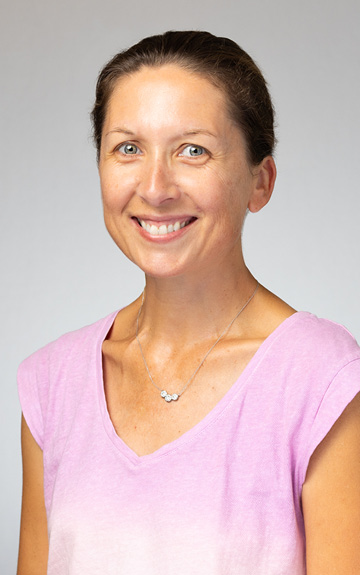Anne Marteel-Parrish
- Professor of Chemistry • Inaugural Frank J. Creegan Chair in Green Chemistry • Associate Dean of Faculty

- 800-422-1782, ext. 7795
- amarteel2FREEwashcoll
- Toll Science S214
Dr. Anne Marteel-Parrish grew up in the North of France and got her engineering degree (equivalent to a master's degree) in Materials Science from the Ecole Polytechnique de Lille in France in 1999. She received a Ph.D. in Chemistry with concentration in Materials Science from the University of Toledo, Ohio in May 2003. Shortly after she was hired as Assistant Professor in Chemistry at Washington College in Chestertown, Maryland. Anne received tenure and was promoted to the rank of Associate Professor in 2009. She achieved full professorship in 2016. She was the Chair of the Chemistry Department at Washington College from 2010 to 2016. In 2011 she was invested as the Inaugural Holder of the Frank J. Creegan Chair in Green Chemistry. She served on and chaired many committees and task forces at Washington College including Tenure and Promotion, Faculty Council, the Committee of Academic Standing and Advising, the Advisory Board for the Cromwell Center for Teaching and Learning, the Sustainability in the Curriculum Committee, and the Budget Task Force to name a few.
In July 2023, Anne became the Associate Dean of Faculty while continuing to serve her department and teaching a reduced load. Her role as Associate Dean of Faculty has given her the opportunity to be involved in most aspects of the college's management and policy making, allowing her to contribute her ideas and innovative and strategic thinking to help Washington College improve.
Education
- Ph.D. in Chemistry with concentration in Materials Science, University of Toledo, OH
- M.S., Engineering Degree in Materials Science, Ecole Polytechnique Universitaire de Lille, France 1999
- B.S., Universite des Sciences et Technologies de Lille, France, 1999
Academic Expertise
- Chemical education
- Green chemistry and sustainability
- Sustainable Development
- Systems Thinking
- Mentoring of students and faculty
My interests lie at the interface of greener and sustainable chemistry and materials science. I am driven by the application of greener chemistry in everything I do, which is about looking at ways to prevent pollution before it is formed. By doing so, we can become better informed citizens and move forward together towards a more sustainable world.
Additional Information
- Associate Dean of Faculty
- Inaugural Holder of the Frank J. Creegan Chair in Green Chemistry
- Co-Chair of the Department of Chemistry
- Deputy Chair of the Chemistry Department
- Chair of the Chemistry Department
- Textbook: Marteel-Parrish, A.E.; Abraham, M.A. “Green Chemistry and Engineering: A Pathway to Sustainability”, 2013, Wiley and Sons Publishers (primary author; E-book published in 2014).
- Publications (peer-reviewed): Zaman, M.A. and Marteel-Parrish, A.E. "A sustainable development approach to promoting water security in Eritrea" in Green Chemistry and UN Sustainability Development Goals, edited by Mark Anthony Benvenuto and Steven Kosmas, Berlin, Boston: De Gruyter, 2022, 129-158.
- Marteel-Parrish, A.E. and Newcity, K.M. “Highlights of the Impacts of Green and Sustainable Chemistry on Industry, Academia and Society in the U.S.A.”, in Johnson Matthey Technol. Rev., 2017, 61(3), 207, DOI:10.1595/205651317x695776 (invited).
- Byers, E.; Marteel-Parrish, A.E. “A Green Chemistry Guided-Inquiry Lab: Designing Biomimetic Songbird Preen Oil from Waste Cooking Oil” in Chemistry Solutions (American Association of Chemistry Teachers), November 2020.
- Marteel-Parrish, A.E. "Delineation of Curricular Innovations Emphasizing Sustainability Across Chemistry Coursework" in "Chemistry Education for a Sustainable Society Volume 2: Innovations in Undergraduate Curricula” ACS Symposium Series #1345 edited by Sherine Obare [North Carolina A&T University; University of North Carolina at Greensboro], Catherine H. Middlecamp [University of Wisconsin-Madison], & Keith E. Peterman [York College of Pennsylvania], 2020. (invited and peer-reviewed)
- Marteel-Parrish, A.E.; Harvey, H. “Applying the principles of green chemistry in art: design of a cross-disciplinary course about “art in the Anthropocene: greener art through greener chemistry'” in Green Chem. Let. Rev., 2019, 12(2), 147-160, DOI: 10.1080/17518253.2019.1609595. (invited and peer-reviewed)
- Penn State's Center for the Study of Higher Education's Academic Leadership Academy nominee and participant (June 2024)
- University of Toledo College of Natural Sciences and Mathematics Outstanding Alumna Award (2016-2017)
- Centennial Award for Excellence in Undergraduate Teaching from Iota Sigma Pi, the National Honor Society for Women in Chemistry (2015)
- Invested as the Inaugural Holder of the Frank J. Creegan Chair in Green Chemistry on November 3, 2011 ($2 million endowment)
- Recipient of the American Chemical Society-Committee on Environmental Improvement Award for Incorporating Sustainability into Chemistry Education (2011)
- Recipient of the Washington College Alumni Association Award for Distinguished Teaching (2010)
- College and Career Readiness Blueprint for Maryland's Future committee (2022-2023)
- STEM Steering Committee for Starters in Kent County (2016-2017)
- Reviewer for National Science Foundation-Major Research Instrumentation proposals (2012-present)
- Member of the Faculty Advisory Board for the Green Chemistry Commitment (2012-2022)
- Character Counts! Kent County Coach at Worton Elementary School (2011-2020)
- Reviewer for the Journal of Chemical Education and Green Chemistry: Letters and Reviews (2010-present)
Motivation and communication are keys to success. To make my lectures attractive and interesting I involve the students in making connections between the different systems that encompass our lives. I incorporate Green Chemistry whenever the topic is appropriate. The students realize that they can contribute to pollution prevention by themselves and they feel responsible, which is the first step to prepare them as citizens for the 21st century.
Chemistry and technologies have contributed in countless ways to improve our way of living and have helped lead to a prosperous economy. At the same time “chemophobia” exists because of the negative image associated with the toxicity of chemicals. This paradox can be overcome if we change our way of thinking to green chemistry and applying it to sustainability. Why don't we stop blaming chemistry and instead use chemistry to contribute to a greener and sustainable world? Let's stop talking and take action!